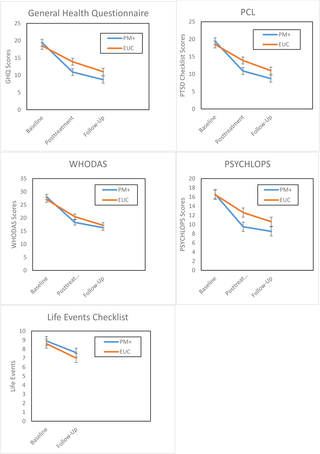PLOS Medicine ( IF 10.5 ) Pub Date : 2017-08-15 , DOI: 10.1371/journal.pmed.1002371 Richard A Bryant 1, 2 , Alison Schafer 3 , Katie S Dawson 1, 2 , Dorothy Anjuri 4 , Caroline Mulili 4 , Lincoln Ndogoni 5 , Phiona Koyiet 4 , Marit Sijbrandij 6 , Jeannette Ulate 7 , Melissa Harper Shehadeh 8 , Dusan Hadzi-Pavlovic 1 , Mark van Ommeren 8

|
Background
Gender-based violence (GBV) represents a major cause of psychological morbidity worldwide, and particularly in low- and middle-income countries (LMICs). Although there are effective treatments for common mental disorders associated with GBV, they typically require lengthy treatment programs that may limit scaling up in LMICs. The aim of this study was to test the effectiveness of a new 5-session behavioural treatment called Problem Management Plus (PM+) that lay community workers can be taught to deliver.
Methods and findings
In this single-blind, parallel, randomised controlled trial, adult women who had experienced GBV were identified through community screening for psychological distress and impaired functioning in Nairobi, Kenya. Participants were randomly allocated in a 1:1 ratio either to PM+ delivered in the community by lay community health workers provided with 8 days of training or to facility-based enhanced usual care (EUC) provided by community nurses. Participants were aware of treatment allocation, but research assessors were blinded. The primary outcome was psychological distress as measured by the total score on the 12-item General Health Questionnaire (GHQ-12) assessed at 3 months after treatment. Secondary outcomes were impaired functioning (measured by the WHO Disability Adjustment Schedule [WHODAS]), symptoms of posttraumatic stress (measured by the Posttraumatic Stress Disorder Checklist [PCL]), personally identified problems (measured by Psychological Outcome Profiles [PSYCHLOPS]), stressful life events (measured by the Life Events Checklist [LEC]), and health service utilisation. Between 15 April 2015 and 20 August 2015, 1,393 women were screened for eligibility on the basis of psychological distress and impaired functioning. Of these, 518 women (37%) screened positive, of whom 421 (81%) were women who had experienced GBV. Of these 421 women, 209 were assigned to PM+ and 212 to EUC. Follow-up assessments were completed on 16 January 2016. The primary analysis was intention to treat and included 53 women in PM+ (25%) and 49 women in EUC (23%) lost to follow-up. The difference between PM+ and EUC in the change from baseline to 3 months on the GHQ-12 was 3.33 (95% CI 1.86–4.79, P = 0.001) in favour of PM+. In terms of secondary outcomes, for WHODAS the difference between PM+ and EUC in the change from baseline to 3-month follow-up was 1.96 (95% CI 0.21–3.71, P = 0.03), for PCL it was 3.95 (95% CI 0.06–7.83, P = 0.05), and for PSYCHLOPS it was 2.15 (95% CI 0.98–3.32, P = 0.001), all in favour of PM+. These estimated differences correspond to moderate effect sizes in favour of PM+ for GHQ-12 score (0.57, 95% CI 0.32–0.83) and PSYCHLOPS (0.67, 95% CI 0.31–1.03), and small effect sizes for WHODAS (0.26, 95% CI 0.02–0.50) and PCL (0.21, 95% CI 0.00–0.41). Twelve adverse events were reported, all of which were suicidal risks detected during screening. No adverse events were attributable to the interventions or the trial. Limitations of the study include no long-term follow-up, reliance on self-report rather than structured interview data, and lack of an attention control condition.
Conclusions
Among a community sample of women in urban Kenya with a history of GBV, a brief, lay-administered behavioural intervention, compared with EUC, resulted in moderate reductions in psychological distress at 3-month follow-up.
Trial registration
Australian New Zealand Clinical Trials Registry ACTRN12614001291673
中文翻译:

对肯尼亚城市有性别暴力史的女性心理困扰的简短行为干预的有效性:一项随机临床试验
背景
基于性别的暴力 (GBV) 是全球心理疾病的主要原因,尤其是在低收入和中等收入国家 (LMIC)。尽管对与 GBV 相关的常见精神障碍有有效的治疗方法,但它们通常需要冗长的治疗计划,这可能会限制 LMIC 的扩大规模。这项研究的目的是测试一种新的 5 次行为治疗的有效性,称为问题管理增强 (PM+),可以教外行社区工作者提供服务。
方法和发现
在这项单盲、平行、随机对照试验中,在肯尼亚内罗毕,通过社区筛查心理困扰和功能障碍,确定了经历过 GBV 的成年女性。参与者以 1:1 的比例随机分配到由接受 8 天培训的非专业社区卫生工作者在社区提供的 PM+ 或由社区护士提供的基于设施的增强常规护理 (EUC)。参与者知道治疗分配,但研究评估者是盲目的。主要结果是心理困扰,通过治疗后 3 个月评估的 12 项一般健康问卷 (GHQ-12) 的总分来衡量。次要结局是功能受损(由世卫组织残疾调整计划 [WHODAS] 衡量),创伤后压力症状(通过创伤后压力障碍检查表 [PCL] 衡量)、个人发现的问题(通过心理结果概况 [PSYCHLOPS] 衡量)、压力性生活事件(通过生活事件检查表 [LEC] 衡量)和健康服务利用. 2015 年 4 月 15 日至 2015 年 8 月 20 日期间,根据心理困扰和功能受损对 1,393 名妇女进行了资格筛查。其中,518 名女性 (37%) 筛查呈阳性,其中 421 名 (81%) 是经历过 GBV 的女性。在这 421 名女性中,209 名被分配到 PM+,212 名被分配到 EUC。随访评估于 2016 年 1 月 16 日完成。主要分析是治疗意向,包括 53 名 PM+ 女性(25%)和 49 名 EUC 女性(23%)失访。P = 0.001) 支持 PM+。在次要结果方面,对于 WHODAS,PM+ 和 EUC 之间从基线到 3 个月随访变化的差异为 1.96(95% CI 0.21-3.71,P = 0.03),对于 PCL,差异为 3.95(95% CI 0.06–7.83, P = 0.05),而 PSYCHLOPS 为 2.15 (95% CI 0.98–3.32, P= 0.001),都支持 PM+。这些估计差异对应于 GHQ-12 评分 (0.57, 95% CI 0.32–0.83) 和 PSYCHLOPS (0.67, 95% CI 0.31–1.03) 支持 PM+ 的中等效应量,以及 WHODAS (0.26, 95) 的小效应量% CI 0.02–0.50) 和 PCL (0.21, 95% CI 0.00–0.41)。报告了 12 起不良事件,所有这些都是在筛选过程中发现的自杀风险。没有不良事件可归因于干预措施或试验。该研究的局限性包括没有长期随访、依赖自我报告而非结构化访谈数据以及缺乏注意力控制条件。
结论
在肯尼亚城市有 GBV 病史的女性社区样本中,与 EUC 相比,一项简短的、非专业的行为干预可在 3 个月的随访中适度减少心理困扰。
试用注册
澳大利亚新西兰临床试验登记处ACTRN12614001291673











































 京公网安备 11010802027423号
京公网安备 11010802027423号